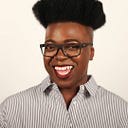People Didn’t Die for a Whitewashed, Corporatized Pride Month
Rallies like Brooklyn Liberation are a crucial way the larger Pride tradition can expand to welcome everyone
Update 6/7/22: Level has a new home. You can read this article and other new articles by visiting LEVELMAN.com.
Pride Month 2020 has been different, to say the least. In addition to a pandemic that has driven celebrations online, the start of June was marked by countless people taking to the streets as Black Lives Matter demonstrations spread to every state. Such a confluence has highlighted an ongoing reckoning about the ways in which the broader LGBTQ+ community excludes and further marginalizes those of us who are Black and Brown. While this month is often an opportunity for queer and trans people to let our rainbow flags fly proudly, it increasingly has become just another set of thirty-something days.
For Sasha Alexander, founder of the nonprofit Black Trans Media, Pride began as “a place of refuge.” The 34-year-old first attended New York City Pride at age 12 — an experience that indirectly inspired them to start Gay-Straight Alliances in their middle and high schools. “I knew in my little Black and Brown body that it was nice to be somewhere where I was being celebrated rather than torn down or harassed,”…

